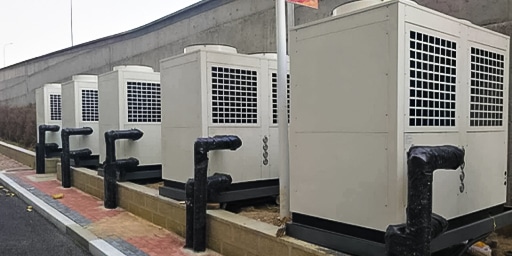Many users who are new to heat pump products will always have this doubt: “Is it called an air source heat pump or an air energy heat pump? Is there a difference between the two?” In fact, air source heat pumps and energy heat pumps refer to the same product, but the names vary from person to person.
Air source heat pump, as the name suggests, heat source is inexhaustible free heat in the air. In the early days of the air source heat pump, people were unfamiliar with this name, so they could not fully understand the product. In the actual promotion process, in order to facilitate customers’ memory and understanding, many heat pump manufacturers changed the name of “air source heat pump” to “air source heat pump”, making an analogy with solar energy, making air source heat pump more well-known and easy to understand.

There are several major differences between air source heat pumps and air conditioners:
1. Different working principles
The air source heat pump mainly applies the inverse Carnot principle. It only needs a small amount of electric energy to drive and can convert the low-level heat energy in the air into high-level heat energy, so as to meet the heating demand. Low-level thermal energy (such as air, soil, water, etc.) cannot be directly exploited and utilized, and the air-energy heat pump, known as the “energy transporter of nature”, can easily transport the energy in the air and convert it into heat. The working principle of air conditioners is fundamentally different from that of air source heat pumps. During the cooling process, the air conditioner mainly uses refrigerant compression to absorb indoor heat, and then releases heat through the outdoor condenser; the heating principle of the air conditioner is “electric heating”. Naturally, the high electricity bills generated cannot be underestimated!
2. Cooling and heating methods are different
The air source heat pump achieves the cooling effect by transforming the air energy, while the air conditioner needs to use freon for liquid conversion and compression, and the fan brings cool air to the room.
In terms of heating, the hot air blown out by the air conditioner is not evenly distributed, which can easily lead to the phenomenon of “the top of the head is hot and the feet are cold”. If the air conditioner is used for heating for a long time, the phenomenon of “dry mouth and tongue” often occurs. Air source heat pumps are generally used in floor heating or radiator heating. The hot air is emitted from bottom to top, gradually forming a gradually decreasing temperature gradient from the soles of the feet to the head, which is in line with the fitness theory of traditional Chinese medicine that warms the feet and cools the top.
3. Applicable areas are different
The air conditioner can operate normally within the temperature range of -7°C~43°C. If you switch to the north where the climate is extremely cold, the air conditioner is prone to failures such as crashes; however, the air source heat pump is not afraid of low temperatures and can continue to operate stably even in an ultra-low temperature environment of -35°C.
4. Different life cycle
The service life of the air conditioner is about 8-10 years, while the service life of the air source heat pump can reach 15 years or even longer, which is durable.
5. Different operating costs
The air conditioner directly uses electric energy to produce heat, so the whole process consumes more electricity; while the air source heat pump does not directly use electricity for heating, and the electricity only plays an auxiliary role in driving the compressor in the whole process, so the power consumption smaller.
6. Different levels of environmental protection
Freon used in air conditioners is a chemical containing chlorine, which will destroy the ozone layer and cause the greenhouse effect. As a new type of green and environment-friendly equipment, air energy does not produce any harmful gases and substances during use, which is conducive to environmental protection and sustainable development!